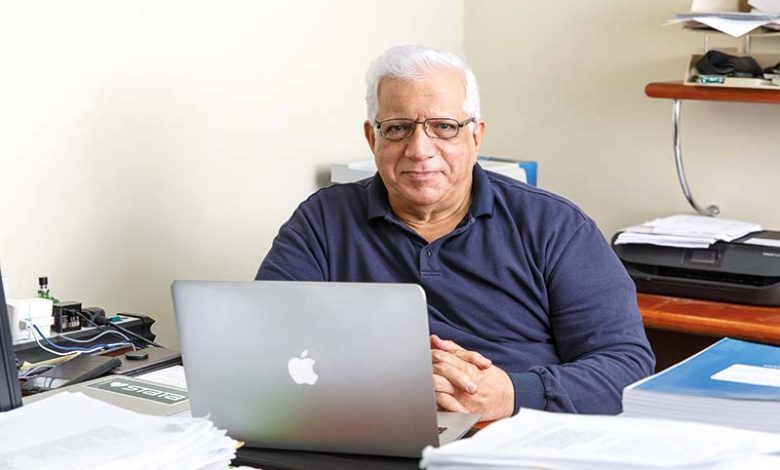Predicting the Post-COVID Future
Economist Sulayman Al-Qudsi uses economic modeling to help policymakers and everyday Kuwaitis plan for the future.

ينصبُّ عمل سليمان القدسي على تصور ما سيكون عليه المستقبل. حصل القدسي المقيم في الكويت منذ فترة طويلة على درجة الدكتوراه في الاقتصاد من جامعة كاليفورنياSulayman Al-Qudsi is in the business of predicting the future. The long-term Kuwait resident earned his doctorate in economics from the University of California, Davis in 1979. He made a career consulting for organizations like the World Bank, the Asian Development Bank, and the Organization of Arab Petroleum Exporting Countries and he now works as a principal research specialist at the Kuwait Institute for Scientific Research (KISR) in its Techno-Economic Division.
لطالما اهتم القدسي بدراسة الكيفية التي تؤثر وفقها التغيرات العالمية في الأنظمة الاقـتصـادية والمجـتمعات. استـكـشف أحـد مشاريعه الأخيرة تأثيرات جائحة كوفيد – 19 وانهيار أسعار النفطAl-Qudsi has always been interested in studying how global changes affect economies and societies. One of his most recent projects explored the effects of two of the most significant changes in his lifetime: the COVID-19 pandemic and a collapse in oil prices, which struck Kuwait and the globe in the first quarter of 2020. With support from the Kuwait Foundation for the Advancement of Sciences (KFAS), Al-Qudsi led a team that modeled the effects of this “double whammy” on Kuwait. Their predictions, first published in April 2021, can help policymakers and everyday Kuwaitis plan for the post-COVID future. “We don’t have a crystal ball,” joked Al-Qudsi, when asked how his team achieved their results. Instead, Al-Qudsi and his research team relied on existing data, new field surveys, and economic modeling methods to make predictions and offer recommendations for a path forward following these shocks.
A Multi-pronged Approach
The idea for the project came to Al-Qudsi about two years ago, just as COVID-19 was declared a pandemic in March 2020. Al-Qudsi’s research team is always “on the lookout” for shifts in global, regional, and Kuwaiti markets. Decades of experience have made them perceptive observers. “When we sense that something is in the offing, we keep monitoring, and we start to collect data and information about it,” he said.
This proactive approach put Al-Qudsi and his colleagues at the cutting edge as COVID-19 swept the globe. As governments shuttered businesses and imposed travel restrictions, the worldwide demand for oil dropped, leading to an unprecedented collapse in oil prices in April 2020. During this period, Al-Qudsi and his colleagues consulted data from the United States, Canada, Latin America, Europe, Asia, and the Middle East to understand how these changes affected regions across the globe and estimate how the changes would affect Kuwait.
However, the available publications did not offer enough information to produce accurate economic models for Kuwait. “When the pandemic hit, there was a real scarcity of data,” said Al-Qudsi.
To develop more accurate models for Kuwait, Al-Qudsi and his team proposed a project that would combine their preliminary research with new survey data. Our objective was to get a good representation and responses from the field,” he said. The team received a letter of support from Khaled Mahdi of Kuwait’s Supreme Council for Planning and Development and funding from KFAS. With this support, they designed and conducted three field surveys to supplement their initial research.
The three surveys were distributed to workers, households, and business leaders across Kuwait, and they provided the research team with exactly what they needed to execute their project. “The data was fresh and illuminating,” Al-Qudsi said. But it painted a dire picture.
Surveyed business leaders reported that they had, on average, lost 30 to 50 percent of their sales during the pandemic. The data showed that small- and medium-sized enterprises were hit hardest, and many were forced to close. Data collected from Kuwaiti and non-Kuwaiti households in the nation showed that family incomes had decreased, as many family members lost jobs or experienced salary reductions during the early months of the pandemic.
With the data from surveyed workers, Al-Qudsi’s team extrapolated that about a quarter of a million foreign workers left Kuwait as they lost their jobs or chose to go back home to be with family amid job uncertainty. Al-Qudsi said that data from the Kuwaiti government later confirmed this estimate.
“The commonality is that the pandemic was savage,” said Al-Qudsi. “It was really harsh on the health sector, on people, on workers, as well as students. Companies were hit hard.”
Finally, Al-Qudsi’s team used econometric and Computable General Equilibrium (CGE) modeling to understand changes and develop predictions. Using CGE models was the perfect approach for the project because the models combine economic theory with real data to measure the impacts of shocks on the economy.
Charting a Path Forward
The team published its first comprehensive report on its findings in April 2021, and it has since published other papers using the same results. These published studies make the struggles of everyday Kuwaitis visible to policymakers in Kuwait and the broader region. They also guide policymakers in charting a path toward recovery following the initial shock of the pandemic and the 2020 collapse in oil prices.
The research also holds insights for the average Kuwaiti about the future of work, education, commerce, and human connection. One of the study’s interesting findings that can help Kuwaitis plan for the future is “tech-celeration,” a term used to describe how fast things change due to technological advancements.
Al-Qudsi’s team found that technology began to penetrate and reshape new sectors during the pandemic in Kuwait and abroad. The changes have been good in some ways, like allowing students to continue learning online when schools were closed thanks to new education technologies. But tech-celeration has also created unemployment for a segment of workers who are not tech-savvy or whose companies were unprepared to shift to tech-centric work environments. This data suggests that workers and companies alike need to prepare for a more tech-oriented online world.
“When we address the policymakers as well as the public at large, we are telling them that you really need to monitor what’s happening,” said Al-Qudsi. Thanks to his research, monitoring the effects of global economic shifts and planning for the future has never been easier.
By Marianne Dhenin



